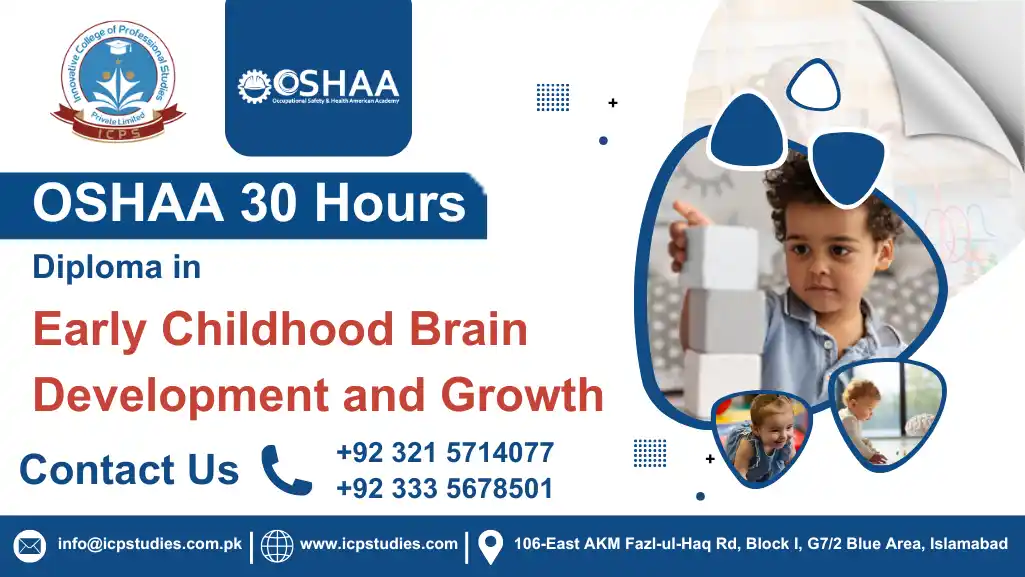Understanding early childhood brain development is fundamental for educators, caregivers, and professionals involved in shaping the lives of young children. The OSHAA 30-Hours Diploma in Early Childhood Brain Development and Growth offers a comprehensive introduction to the critical stages of brain growth and the factors that influence cognitive, emotional, and social development during early years.
The early years of a child’s life lay the foundation for future learning, behaviour, and health. During this period, rapid brain development occurs, making it crucial to provide nurturing environments that support optimal growth. This diploma equips learners with evidence-based knowledge on how brain development impacts language acquisition, emotional regulation, and problem-solving abilities, enabling them to foster supportive and stimulating settings.
The OSHAA 30-Hours Diploma in Early Childhood Brain Development and Growth is an essential qualification for anyone passionate about nurturing young minds. By understanding the complex processes behind brain development, learners are empowered to create environments that foster healthy growth, learning, and wellbeing during the most formative years of life.
Whether you are an educator, parent, or childcare professional, this diploma equips you with the tools to make a lasting positive impact on children’s futures.
All About OSHAA 30-Hours Diploma in Early Childhood Brain Development and Growth
Course Overview
The OSHAA 30-Hours Diploma in Early Childhood Brain Development and Growth is a comprehensive programme designed to equip learners with a deep understanding of how the human brain develops during the crucial early years of life. Grounded in current neuroscience and developmental psychology, the course explores the vital processes that influence cognitive, emotional, social, and physical growth from birth to age five.
This diploma provides practical knowledge for applying developmental principles in real-life settings, enabling educators, childcare providers, and parents to create nurturing environments that support healthy brain development. Participants will explore how early experiences, nutrition, environment, and relationships contribute to shaping the brain’s architecture during a child’s most formative years.
Through interactive and flexible learning modules, the course covers essential topics such as neural development milestones, the impact of early intervention, and the importance of play and language in cognitive growth. Learners will be able to apply this knowledge to support developmental progress and identify early signs of delays or challenges.
Upon successful completion, learners receive a recognised qualification that enhances their understanding and ability to foster optimal early childhood development. The course is ideal for professionals and caregivers seeking to positively influence children’s lifelong learning and wellbeing through informed, evidence-based practices.
Study Units
- Introduction to Early Childhood Brain Development (3 hours)
- Key Stages of Brain Development in Early Childhood (4 hours)
- The Role of Genetics and Environment in Brain Growth (4 hours)
- Sensory Experiences and Cognitive Development (5 hours)
- The Importance of Attachment and Emotional Development (4 hours)
- Language Development and its Impact on Brain Function (4 hours)
- Motor Skills Development and Brain Growth (3 hours)
- Nutrition and Physical Activity in Early Brain Development (3 hours)
To ensure learners can successfully engage with the course content and outcomes, the following entry requirements apply:
- Language Proficiency: Learners should possess a functional level of English, both written and spoken, to fully comprehend course materials and complete any assessments. Non-native English speakers may be asked to demonstrate language competency.
- Minimum Age: Applicants must be at least 18 years old at the time of enrolment.
- Educational Background: A basic level of secondary education is recommended. While no formal qualification is mandatory, an interest or background in child development, early years education, or related fields is advantageous.
- Work Experience: No prior work experience is required. However, individuals currently working with children or in educational settings may find the course particularly beneficial and relevant.
The OSHAA 30-Hours Diploma in Early Childhood Brain Development and Growth is suitable for a wide range of individuals who are involved in, or interested in, the care and development of young children, including:
- Anyone with a personal or professional interest in early childhood brain development and wellbeing
- Early years educators and nursery practitioners
- Childcare providers and support workers
- Primary school teaching assistants and learning support staff
- Parents and guardians seeking to better understand child development
- Social workers and family support professionals
- Healthcare professionals working with infants and toddlers
- Students pursuing a career in early childhood education or child psychology
Learning Outcomes
Introduction to Early Childhood Brain Development (3 hours)
- Understand the basic structure and function of the developing brain in early childhood
- Identify the significance of early brain development in lifelong learning and behaviour
- Recognise the importance of early intervention and responsive caregiving
Key Stages of Brain Development in Early Childhood (4 hours)
- Describe the major developmental milestones in brain growth from birth to age five
- Explain how brain architecture forms and strengthens through early experiences
- Understand critical periods for sensory, language, and emotional development
The Role of Genetics and Environment in Brain Growth (4 hours)
- Explain how genetic factors influence early brain development
- Identify the impact of environmental factors such as caregiving, stimulation, and stress
- Explore the interaction between nature and nurture in shaping brain development
Sensory Experiences and Cognitive Development (5 hours)
- Understand how sensory input contributes to neural connections and learning
- Recognise the role of visual, auditory, tactile, and motor experiences in brain development
- Apply strategies to enhance cognitive growth through rich sensory environments
The Importance of Attachment and Emotional Development (4 hours)
- Understand the link between secure attachment and healthy emotional development
- Identify how early relationships influence brain function and behavioural regulation
- Explore ways to foster emotional security and resilience in young children
Language Development and its Impact on Brain Function (4 hours)
- Describe how language exposure influences brain structure and connectivity
- Understand the stages of language acquisition in early childhood
- Apply techniques to support language-rich interactions and communication skills
Motor Skills Development and Brain Growth (3 hours)
- Recognise the connection between physical movement and brain development
- Identify key milestones in fine and gross motor skill progression
- Understand how motor activities support coordination, problem-solving, and learning
Nutrition and Physical Activity in Early Brain Development (3 hours)
- Understand the importance of balanced nutrition in supporting neural growth
- Identify the role of physical activity in enhancing cognitive and motor development
- Apply dietary and activity recommendations to promote healthy brain function in young children
FAQs OSHAA 30-Hours Diploma in Early Childhood Brain Development and Growth







